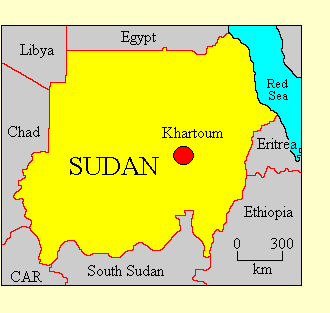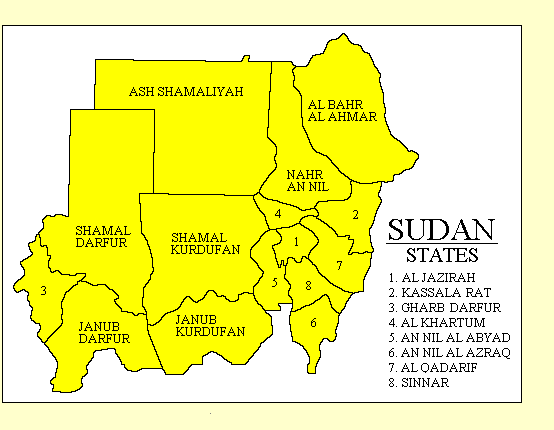

REPUBLIC OF SUDAN
• Official name: Jumhuriyat as-Sudan (Republic of Sudan)
• Location: East Africa
• International organisations: African, Caribbean and Pacific Group of States, African Union, Arab League,
Non-Aligned Movement, Organisation of Islamic Conference, United Nations
• Borders: Central African Republic, Chad, Egypt, Eritrea, Ethiopia, Libya, Southern Sudan
• Coastline: Red Sea
• Land area: 1,886,068 Km2
• Population: About 30,000,000 (the 2008 census was of doubtful reliability)
• Annual GDP (PPP) per capita: US$2,300 (2009 CIA estimate). World ranking: 148
• Ethnicity: The large majority of the Sudanese are of Arab or mixed Arab-Nubian descent. In the Darfur region the
population is mainly black African, the main ethnic group being the Fur. There are small European, Armenian and Indian minorities.
• Languages: Arabic is the official language and is generally used.
• Religion: Islam was the state religion until 2005, when the new constitution abolished this status. The
large majority of Sudanese are Sunni Muslim.

• Form of government: Military dictatorship. Sudan is divided into 15 states.
• Capital: Khartoum
• Constitution: Sudan has had four constitutions since independence, but all have been suspended following
coups. The 1998 constitution
was suspended in 1999 due to conflicts within the regime. A
new constitution was introduced in 2005.
• Head of state: The President, in theory elected by direct univeral suffrage for a five-year term.
• Head of government: The President, who appoints all ministers.
• Legislature: Sudan has a bicameral legislature. The National
Assembly (Majlis Watani), has 450 members. The last elections to this body were held in April 2010, when the ruling party won most of the
seats. The Council of States is made up of 50 members indirectly elected by state legislatures.
The legislature has no real power and candidates opposed to the government cannot contest elections.
• Electoral authority: Elections are conducted by the government.
• Freedom House 2011 rating: Political Rights 7, Civil Liberties 7
• Transparency International Corruption Index: 16% (172 of 178 countries rated)
• Reporters Without Borders Press Freedom 2010 Index: 14.7% (172 of 178 countries rated)
• Heritage Foundation Economic Freedom 2010 Index: no rating given
Political history
The Ottoman Empire acquired Egypt in 1517 and claimed sovereignty over the Sudan area,
but did not penetrate the area until the 1820s. When the British assumed de facto control
over Egypt, they also acquired control of Sudan. From 1899 to 1956 Sudan was officially an Anglo-Egyptian
"condominium" but was effectively ruled by the British.

After World War II the country moved towards independence, with the first elections being held
in 1948. A party which favoured union with
Egypt won the second elections in 1952, but the republican revolution
in Egypt changed Sudanese opinions, and the legislature opted for independence, which
came in 1956. With 18 months there was a military coup. The military government handed
power back to civilians in 1964, but there was another coup in 1969, which brought the
durable radical dictator Gaafar Nimeiry to power.
The chronic problem of independent Sudan has been that the Christian/animist
south has never accepted rule by the Moslem north, an issue aggravated by Nimeiry's
attempt in 1983 to impose Shari'a law on the country. Insurrection in the south began in the late
1960s and continued intermittently until 2005.
Nimeiry's failure to defeat the insurrection in the south led to another coup
in 1985, which brought a civilian government to power. Elections were held in 1986, but
the government of Sadiq al Mahdi could find no solution to the southern problem. Another
coup in 1989 brought the present military regime, dominated by militant Islamists, to
power. In internal power struggle in 1999 saw
Omar al-Bashir emerge as the regime's
undisputed strongman. In 2000 he was elected President for a five-year term against token opposition.
No further elections were held until April 2010, when Bashir was re-elected without serious opposition.
Although there has been some liberalisation since 2008, Sudan is for practical purposes a one-party state, dominated by President
Bashir's National Congress Party, which provides a civilian facade for military rule
and a vehicle for the regime's Islamist ideology. The imposition of Islamism further
alienated the south. In 2005 there was an agreement between the central government and the southern
leadership for a referendum on southern independence in 2011.
Since 2003 a separate conflict has raged
in the western region of Darfur, with the region's African Muslim population rebelling against the central
government. The regime has responded with extreme violence, leading to at least 300,000 deaths. Freedom House
noted in 2009: "It is widely accepted that the government has directed and assisted the systematic killing of
tens or even hundreds of thousands of people in Darfur since 2003, including through its support for militia
groups that have terrorized civilians." In 2009 Bashir was indicted as a war criminal by the International
Criminal Court.
The referendum in Southern Sudan went ahead in January 2011 and resulted in a nearly unanimous vote for
independence, which took place place in July. As a result, Sudan lost 619,000 Km2 of territory and at least 8.3 million
people (final frontiers between the two states have not been finalised). This has produced a nation which is more unified
in ethnicity, religion and language.
Freedom House's 2011
report on Sudan
(which was written before South Sudan became independent) says:
"Sudan is not an electoral democracy. The transitional government and legislature in place until May 2010
were unelected, and the presidential and legislative elections of April 2010 failed to meet international
standards, according to monitors from the United States, the European Union, and Sudan itself...
There were irregularities at every stage of the polls, beginning with the drawing of district boundaries
based on census results that overstated the population in areas controlled by the ruling NCP and
undercounted opposition strongholds in the South and Darfur. During the voter registration period there
were reports that some people were stopped from registering while others registered illegally.
Insufficient attempts were made to educate citizens about the complex voting procedure...
The decision by much of the opposition to boycott the elections cleared the way for resounding wins for the
NCP in the North and the SPLM in the South. Both parties used intimidation and in some cases violence to
ensure victory, particularly the SPLM... Sudan is considered one of the world’s most corrupt states. The
NCP tightly controls the national economy and uses the wealth it has amassed in banking and business to
buy political support. During the 2010 elections there were widespread reports that the NCP paid rival
candidates to withdraw from the polls... The 2005 interim constitution recognizes freedom of the press,
but the media face significant obstacles in practice... Religious freedom, though guaranteed by the 2005
interim constitution, is not upheld... Freedom of assembly is restricted. The authorities routinely withheld
permission for opposition rallies and other political meetings during the election campaign...
The judiciary is not independent. Lower courts provide some due process safeguards, but the higher courts
are subject to political control, and special security and military courts do not apply accepted legal
standards."
Updated November 2011
|


